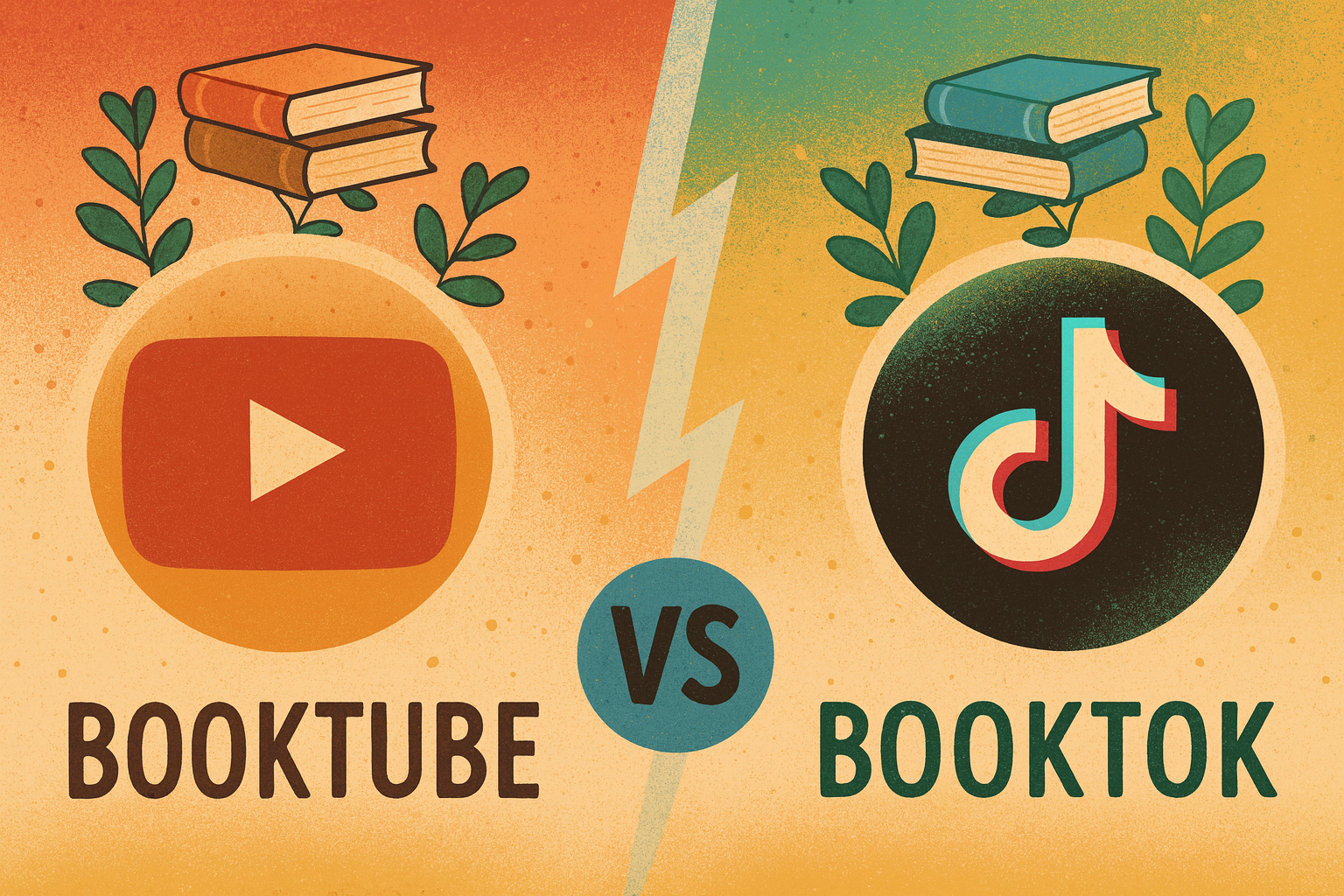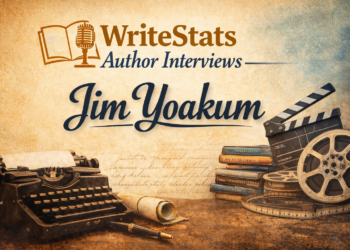If you love books, there’s a good chance you’ve fallen down at least one digital rabbit hole recently, maybe you clicked on a BookTube video and ended up watching bookshelf tours for hours, or you scrolled through BookTok, promising yourself “just one more video” before bed. In 2025, the debate of BookTube vs BookTok is more alive than ever. Both platforms have reshaped how readers discover stories, share emotions, and build communities.
But if you had to pick just one to focus on, which platform truly fits your reading life?
Content Format and Depth: Conversations vs Reactions
BookTube: The Home of Long Conversations
If you’ve ever curled up with a cup of tea and watched a 30-minute reading vlog, you know the cozy power of BookTube. Most BookTube videos range from 10 to 40 minutes, giving creators plenty of time to unpack a story’s themes, dissect characters, or passionately rant about disappointing endings.
It’s not just “reviews”, it’s intellectual companionship. Viewers come for the book talk but stay for the personalities, inside jokes, and the feeling of hanging out in a friend’s living room, surrounded by overflowing shelves.
Typical BookTube content includes:
- Detailed book reviews (often with spoilers and thoughtful critique)
- Reading vlogs and 24-hour reading challenges
- TBR lists and wrap-ups
- Thematic deep dives (e.g., “The evolution of Gothic heroines”)
- Collaborative readathons and livestream sprints
This long-form content allows for nuance, context, and emotional build-up, making it ideal for readers who enjoy analyzing what they read.
BookTok: The Home of Emotional Reactions
On BookTok, everything happens in under a minute. A single gasp, cry, or one-sentence pitch can make a book go viral overnight. Instead of structured analysis, BookTok thrives on emotional punch and visual storytelling, quick edits, trending sounds, dramatic reveals, and aesthetic montages.
A creator might flip through a book whispering, “I wasn’t ready for Chapter 47,” and suddenly thousands of users are adding it to their TBRs.
Common BookTok formats include:
- “Books that made me sob at 2 a.m.” lists
- POV edits (placing viewers inside a story’s atmosphere)
- Quick tropes breakdowns (“Enemies to lovers but make it morally gray”)
- Hyper-emotional reactions that intrigue without spoilers
This format mirrors how many readers actually experience books, viscerally and in bursts of feeling.
BookTube vs BookTok: Discovery Patterns That Change How We Find Books
BookTube: Intentional Exploration
BookTube functions like a classic library: you pick your favorite creators, subscribe, and return again and again. Discovery happens through active searching, whether for a specific genre, author, or in-depth analysis.
YouTube’s algorithm does play a role, but BookTube relies far more on loyalty and shared taste. Viewers find creators whose reading styles align with theirs, leading to sustained trust over time.
For example, if a BookTuber whose recommendations have never failed you raves about a debut fantasy novel, you’ll probably buy it the same day.
BookTok: Algorithmic Serendipity
BookTok works more like walking into a bustling book fair blindfolded and letting the crowd guide you. The For You Page is algorithm-driven, meaning you don’t need to follow anyone to get content. TikTok learns your preferences frighteningly fast: watch one romantasy video to the end, and suddenly you’re being bombarded with “five books with morally gray fae princes.”
This passive discovery can feel magical. You stumble across unexpected titles, hidden gems, or entire subgenres you didn’t even know existed.
For a deeper dive into how BookTok influences reading habits seasonally, check out:
👉 BookTok Seasonal Reading Trends: How BookTok Transformed Seasonal Reading Culture
Audience Demographics: Generations of Bookworms
BookTube’s Mature, Analytical Crowd
BookTube’s audience skews slightly older, typically mid-20s to 40s. These are readers who grew up with YouTube and often have well-established reading habits. They’re more likely to engage in long discussions, follow creators for years, and appreciate detailed, spoiler-filled breakdowns.
Genres often thriving on BookTube include literary fiction, complex fantasy, classics, historical fiction, and nonfiction deep dives.
BookTok’s Young, Trend-Driven Energy
BookTok is dominated by readers under 25, who often discover books through short, emotional bursts rather than analytical reviews. This generation grew up on fast-paced content, and their tastes reflect that: romantasy, YA, dark academia aesthetics, and spicy trope-driven stories thrive here.
TikTok’s visual-first culture makes it perfect for aesthetic storytelling; beautiful covers, annotated pages, or room makeovers inspired by fictional worlds.
BookTube vs BookTok: Content Quality vs Virality
One of the most fascinating aspects of BookTube vs BookTok is how each platform balances quality and virality.
- BookTube prioritizes personality, depth, and community. Videos are carefully structured, edited, and meant to age well. A 2021 video recommending hidden fantasy gems might still rack up thousands of views years later because of YouTube’s SEO.
- BookTok, in contrast, is powered by speed and shareability. A clever 10-second video can catapult a backlist book onto bestseller lists overnight, but that same video might vanish into the algorithm the next day.
This is why you’ll often see BookTok ignite a trend, while BookTube sustains it through analysis, discussions, and follow-up content.
By the Numbers: BookTube vs BookTok
Data helps cut through the hype. According to Nielsen Book Data:
- 34% of young people discover books on YouTube, compared to 32% on TikTok, indicating that BookTube has a slight edge in book discovery, despite BookTok’s explosive trends.
- BookTube content lasts longer, both in watch time and discoverability, thanks to YouTube’s searchability and evergreen algorithm.
- BookTok is unbeatable in viral velocity, often pushing lesser-known titles onto bestseller lists within days.
Community dynamics are also key:
- BookTube fosters deep creator-subscriber bonds, leading to loyal communities and recurring discussions.
- BookTok thrives on fluid, trend-based interactions, where content spreads fast but doesn’t always lead to long-term creator followings.
For historical parallels, check out:
👉 True Crime Literary Evolution: From Victorian Scandal Sheets to Modern Masterpieces
It’s fascinating how platforms—old and new—shape what stories thrive.
BookTube vs BookTok: Community Dynamics and Reader Engagement
BookTube: Feels Like a Book Club
BookTube’s comment sections often read like mini-forums. People write paragraphs debating themes, recommending similar reads, or joining group readathons. Live reading sprints mimic the feeling of being in a quiet room with friends, everyone reading together. There’s a sense of shared ritual.
Many BookTubers also host readalongs, Patreon book clubs, or Discord communities, building intimate ecosystems where bookworms feel genuinely at home.
BookTok: Feels Like Riding a Trend Train
BookTok thrives on collective excitement. When a book starts trending, everyone joins in. You see emotional reaction videos, fan edits, aesthetic reels, and trope breakdowns flood your FYP. It’s chaotic, thrilling, and addictive.
While the relationships might not be as personal, the sense of collective momentum is unparalleled. You don’t just read a trending BookTok book; you experience the wave.
To get started on BookTok, here are the essential BookTok accounts to follow for your next great read.
Final Verdict: Which Platform Should Readers Choose?
The real answer? It depends on your reading personality:
- Choose BookTube if you love in-depth conversations, cozy community vibes, and discovering books through trusted voices. It’s perfect for thoughtful readers who enjoy analysis and slow immersion.
- Choose BookTok if you want fast, emotional, visual recommendations and love riding the wave of viral trends. It’s perfect for readers who crave spontaneity and love finding unexpected gems.
- Or, like many modern bookworms, embrace both: let BookTok surprise you, then head to BookTube for the deep dive before you crack the spine.
For readers ready to dive deeper into BookTube, check out this expert guide to the best BookTube channels by genre.
Final Thoughts: BookTube vs BookTok
BookTube vs BookTok isn’t a rivalry; it’s a reflection of how diverse reading cultures have become. One offers longevity and depth, the other momentum and discovery. Together, they’re transforming how stories find their readers.
Whether you prefer a quiet evening watching reviews or a midnight scroll through aesthetic edits, both platforms can make your reading life richer, more connected, and more exciting than ever.









